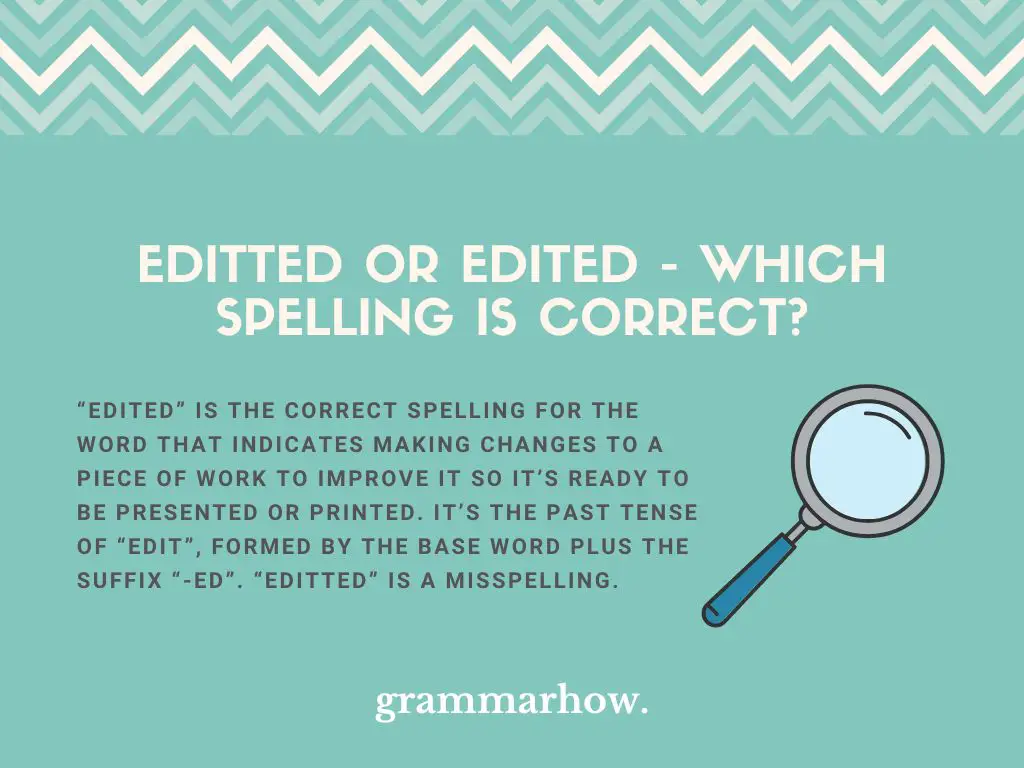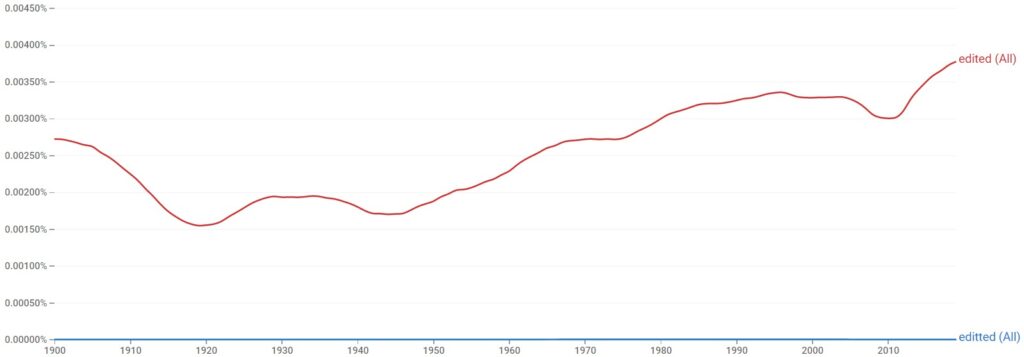When you make changes to a piece of work, intending to make it better, do you say you “Editted” it or you “Edited” it?
We want to know which is the correct spelling for that word, as well as the most appropriate way to use it. Let’s go!
Editted or Edited – Which Spelling Is Correct?
“Edited” is the correct spelling for the word that indicates making changes to a piece of work to improve it so it’s ready to be presented or printed. It’s the past tense of “Edit”, formed by the base word plus the suffix “-ed”. “Editted” is a misspelling.

Take a look at the examples below:
- Jane editted her paper before submitting it. (incorrect)
- Jane edited her paper before submitting it.
“Edited” and “Editted” aren’t interchangeable forms because one is correct and the other isn’t. The form “Editted”, with a double “t”, is incorrect and shouldn’t be used. The rule doesn’t require that “Edit” receives another consonant before incorporating the suffix “-ed” to form its past tense.
“Edited” is the correct form you should use in your sentences when talking about “Editing” work in the past tense.
Editted
“Editted” is a misspelling of the word “Edited”. It’s incorrect and shouldn’t be used. As the past tense of the regular verb “Edit”, “Edited” is the combination of “Edit” plus the suffix “-ed”, used to indicate the past tense.
No rule requires the last consonant of the word to be doubled, and using a double “t” is an excess that makes the word incorrect. “Edited” is the correct form of the word, while “Editted” is not.
Is “Editted” a word at all? It’s not. According to The Cambridge Dictionary, “Editted” is a misspelling of a word. The dictionary presents a list of words that could potentially be mistaken for “Editted”.
We’ll take a look at some examples that include the incorrect form “Editted”, followed by a corrected version of the same sentence.
- Mark editted the footage, as that was his only task. (incorrect)
- Mark edited the footage, as that was his only task.
- I’ve editted countless books in my career. (incorrect)
- I’ve edited countless books in my career.
- Marcus has editted many screenplays over the years. (incorrect)
- Marcus has edited many screenplays over the years.
Edited
“Edited” is the past tense of the verb “Edit”, which relates to making changes to a piece of work, to make it better. People edit all sorts of work, either by themselves or with the help of an “Editor” who guides them through the changes that must be made.
In The Cambridge Dictionary, we find the following definition of “Edit”: “to make changes to a text or movie, deciding what will be removed and what will be kept in, to prepare it to be printed or shown”.
Take a look at some good examples below:
- I edited my paper last night.
- We’ve edited the movie down to one hour and twenty-seven minutes.
- How many times has this article been edited?
- Has the draft been edited already?
- I’ve edited books for a variety of different publishers.
Which Is Used the Most?
Which one of those forms is used more often, “Editted” or “Edited”? Take a look at the graph from Google Ngram Viewer below.

The simpler form, “Edited” is the word used more often according to the graph. This is what we expected to see reflected on it because “Edited” is the correct form people should use in their communications.
The graph indicates that the word “Edited” has steadily increased in usage since 1920. We believe that is the case because since then more work has been produced and more pieces have gone through an “Editing” process of some kind.
“Editting”, with a double “t”, is rarely used and appears only at the bottom of the graph. Keep in mind that this form of the word is incorrect and shouldn’t be used.
Final Thoughts
“Edited” is the correct word to indicate when someone made changes to a piece of work to make it ready to be presented or printed. It’s the past tense of the regular verb “Edit”. “Editted” is an incorrect form that should be avoided.

Martin holds a Master’s degree in Finance and International Business. He has six years of experience in professional communication with clients, executives, and colleagues. Furthermore, he has teaching experience from Aarhus University. Martin has been featured as an expert in communication and teaching on Forbes and Shopify. Read more about Martin here.

